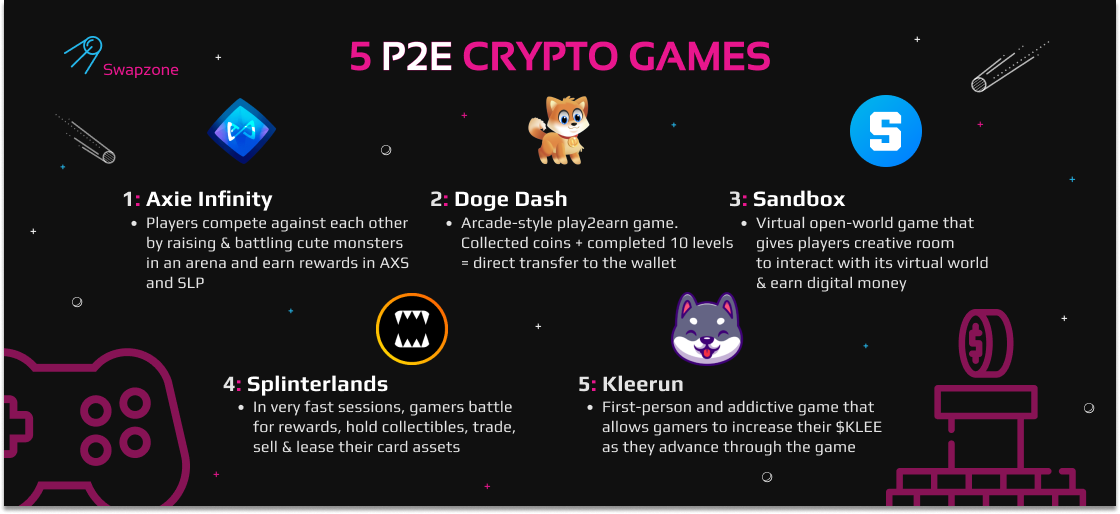Play to earn rewards: a fun way to turn gaming into a profitable hobby
Why Play-to-Earn Incentives Are Changing the Way You Play and Make
The emergence of play-to-earn models symbolizes a notable shift in the video gaming landscape, welcoming gamers to discover not only the home entertainment worth of video games yet likewise their potential as income-generating platforms. Comprehending these characteristics elevates relevant questions regarding the future of video gaming and the ramifications for both gamers and programmers alike.
Emergence of Play-to-Earn Designs
In the last few years, the gaming market has actually witnessed a considerable transformation with the emergence of play-to-earn versions, essentially modifying how gamers engage with electronic environments. This innovative approach permits gamers to obtain tangible benefits via their in-game tasks, developing a shift from standard gaming standards where pleasure and competitors were the primary motivations.
Play-to-earn versions leverage blockchain innovation and non-fungible tokens (NFTs) to give players with possession of in-game properties, which can be traded or cost real-world currency. Consequently, players are incentivized to spend effort and time into video games, promoting a sense of company and financial opportunity. play to earn rewards. This shift has brought in a diverse player base, consisting of those that might have formerly seen pc gaming as a purely recreational task
Numerous systems have actually emerged, showcasing effective applications of this model, such as Axie Infinity and Decentraland. These systems have not only created significant income however likewise stimulated conversations around the sustainability and ethics of such economic systems. As play-to-earn versions proceed to evolve, they assure to redefine the relationship in between gamers, designers, and the broader digital economic climate, paving the means for a new age in gaming.
Benefits for Gamers
As gamers involve with play-to-earn versions, they open a variety of advantages that prolong past mere entertainment. Unlike typical pc gaming, where players spend time and money without substantial returns, play-to-earn systems permit players to earn copyright or in-game assets that can be converted to real-world value.
In addition, play-to-earn versions promote area building amongst players. Players often work together to attain common goals, consequently cultivating social connections that enrich the overall experience. This feeling of area can bring about participating gameplay, where gamers share methods and sources, improving both personal and team success.
In addition, these versions can equalize access to gaming by allowing gamers from varied economic backgrounds to benefit financially. By taking part in play-to-earn communities, people can get abilities and understanding about blockchain technology, more expanding their profession opportunities in the expanding digital economic climate. Eventually, the advantages for players prolong well beyond gameplay, affecting their social, financial, and instructional landscapes favorably.
Obstacles in the Community
While the play-to-earn community offers considerable opportunities, it is not without its obstacles. One major problem is the volatility of in-game currencies and properties, which can cause unpredictable incomes for gamers. Variations in value can prevent potential gamers who seek secure earnings streams - play to earn rewards. In addition, the complexities of blockchain modern technology may puzzle individuals not familiar with digital currencies, creating barriers to entry.
One more obstacle is the risk of scams and deceitful systems that can plague the environment. Gamers might experience misleading systems assuring high rewards however eventually this leading to monetary loss. Ensuring count on and safety is crucial for the long-term practicality of play-to-earn designs.
In addition, the ecological influence of blockchain gaming can not be neglected. The energy consumption related to mining and deal handling increases honest concerns regarding sustainability. Video game designers need to locate an equilibrium in between rewarding players and reducing environmental footprints.
Lastly, the regulatory landscape is still developing, positioning potential risks for developers and gamers alike. Uncertain lawful structures can prevent development and limit the development of play-to-earn communities. Resolving these difficulties is essential for realizing the complete possibility of this transformative video gaming paradigm.
The Role of Blockchain Technology
Blockchain modern technology acts as the backbone of the play-to-earn ecosystem, addressing much of the obstacles formerly detailed. By utilizing decentralized journals, blockchain makes sure transparency and security in purchases. Gamers can confidently gain and trade in-game possessions, knowing that possession is proven and not subject to adjustment.

Tokenization of possessions plays a vital function, giving players true possession of their in-game products, which can be purchased, sold, or traded on various marketplaces. This urges a vibrant second market, where gamers can monetize their abilities and time bought the game.
Furthermore, blockchain modern technology makes it possible for interoperability between various games and platforms, permitting gamers to bring their assets throughout numerous ecological communities. This adaptability not only improves customer experience yet likewise promotes a much more comprehensive gaming atmosphere, inevitably improving the landscape of gaming and earning.
Future Patterns in Pc Gaming
The pc gaming industry is on the verge of a transformative development, driven by emerging technologies and shifting player expectations. As play-to-earn models gain grip, gamers are increasingly seeking immersive experiences that blend amusement with tangible rewards. This shift is triggering programmers to introduce, concentrating on creating engaging gameplay that fosters about his neighborhood and interaction.
One significant pattern is the assimilation of digital reality (VR) and enhanced truth (AR), improving the video gaming experience by supplying much deeper immersion and interactive settings. In addition, advancements in synthetic intelligence are enabling much more innovative check here non-player personalities (NPCs) and flexible gameplay, customizing experiences to individual player choices.

Final Thought
Finally, the play-to-earn version is considerably changing the video gaming landscape by allowing gamers to obtain real-world worth from their in-game tasks. This standard change not only boosts player engagement and investment however additionally elevates challenges that need to be resolved to make sure sustainability within the ecological community. As blockchain modern technology proceeds to promote possession of electronic possessions, the future of gaming assures additional advancement and chances for gamers throughout diverse histories.